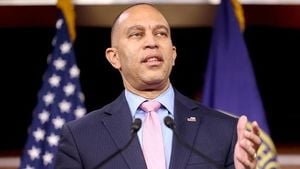Homeland Security Secretary Kristi Noem is no stranger to controversy, but the latest firestorm ignited not from a policy decision or a political rally, but from the animated satire of South Park. On August 7, 2025, the long-running Comedy Central show aired an episode that took direct aim at Noem, lampooning her as a vain, Botox-obsessed ICE agent who kills puppies and targets Hispanic individuals for arrest. The depiction, which included exaggerated makeup and a melting face, drew a sharp rebuke from Noem herself, who called the show’s creators "lazy" and "petty" for mocking her appearance instead of her job performance.
Speaking on Glenn Beck’s podcast the same day the episode aired, Noem, 53, did not mince words. “It never ends, but it’s so lazy to constantly make fun of women for how they look,” she said, as reported by The Guardian. “It’s always the liberals and the extremists who do that. If they wanted to criticize my job, go ahead and do that, but clearly they can’t, they just pick something petty like that.” Noem admitted she hadn’t actually watched the episode, explaining she was too busy “going over budget numbers and stuff.”
The South Park episode didn’t just lampoon Noem’s appearance. It also referenced a real-life controversy from her 2024 memoir, No Going Back, in which she described killing her family’s dog and an unruly goat. The show’s writers linked this to her public persona, showing her shooting dogs and tying it to her appearances at Immigration and Customs Enforcement (ICE) raids and at El Salvador’s notorious Terrorism Confinement Center (CECOT), where she posed for photos in front of prisoners. According to Latin Times, these scenes were clear digs at her tough-on-crime image and willingness to embrace harsh measures.
But Noem wasn’t the only member of the Trump administration in South Park’s crosshairs. The episode also featured Vice President JD Vance as a miniature cartoon character, depicted oiling Satan’s rear end for President Trump. Vance, for his part, seemed to take the jab in stride, quipping on social media, “Well, I’ve finally made it.” The show’s irreverence extended to Trump himself, who was portrayed in the season opener complaining about his body while in bed with Satan—a scene that helped the show’s 27th season premiere become the most-watched on cable that day, drawing 5.9 million viewers across Comedy Central and Paramount+, as reported by Latin Times.
The White House, however, appeared less amused. After a string of episodes roasting President Trump and his administration, officials dismissed South Park as “irrelevant” and accused its creators of seeking attention. This dismissal, though, only fueled the show’s engagement with current events. In a twist of irony, just before the Noem episode aired, the Department of Homeland Security (DHS) used a screencap from South Park to promote ICE recruitment. The agency’s statement read, “We want to thank South Park for drawing attention to ICE law enforcement recruitment: We are calling on patriotic Americans to help us remove murderers, gang members, pedophiles, and other violent criminals from our country. Benefits available to new ICE recruits include an up to $50,000 signing bonus, student loan forgiveness, and retirement benefits.”
The move was immediately noticed by South Park’s official account, which fired back, “Wait, so we ARE relevant?”—a cheeky reference to the White House’s earlier dismissal. This back-and-forth underscored the show’s knack for inserting itself into the national conversation, especially when its relevance is called into question. According to Latin Times, the renewed attention comes at a time when South Park has inked a major business deal with Paramount, valued at around $1.5 billion and including global streaming rights, cementing its place in the cultural zeitgeist for years to come.
Noem’s criticism of the show as sexist and superficial taps into a broader debate about the boundaries of satire and the role of political comedy. “If they wanted to criticize my job, go ahead and do that. But clearly they can’t – they just pick something petty like that,” she reiterated on Beck’s show. Her comments have resonated with some supporters, who see the mockery as emblematic of a media culture quick to attack conservative women on personal grounds. Others, however, argue that public figures—especially those wielding significant power—should expect and endure pointed satire, even when it crosses into uncomfortable territory.
Since joining the Trump Cabinet earlier in 2025, Noem has become a visible face of the administration’s immigration crackdown, staging photo ops at deportation raids and high-security prisons abroad. These actions have made her a lightning rod for criticism from progressives, but also a favorite among the administration’s base. The South Park episode, by linking her on-screen persona to these real-life events, amplified the national debate over immigration enforcement, public image, and the ethics of political ridicule.
Meanwhile, the show’s willingness to lampoon both sides of the aisle—skewering Trump, Vance, and even conservative media figures like Glenn Beck—has kept it at the center of American satire. Beck himself recalled his own experience being parodied by South Park in a 2009 episode, telling Noem that it took him a year to learn about the episode, which he eventually watched with his son. That episode, “Dances with Smurfs,” featured Eric Cartman using his platform to spread wild accusations, a clear nod to Beck’s own style at the time.
The season 27 premiere’s ratings surge and the show’s billion-dollar deal with Paramount underscore its enduring influence. Despite White House claims to the contrary, South Park remains a powerful force in American culture, capable of sparking national debates with a single episode. Whether one sees its humor as sharp social commentary or as crossing the line into cruelty, the conversation it generates is a testament to its staying power.
For Kristi Noem, the episode may have been an unwelcome distraction from her work—she insists she was too busy with budget numbers to watch—but it has undeniably thrust her into the spotlight once again, raising questions about the intersection of politics, media, and the limits of satire in a polarized America.





